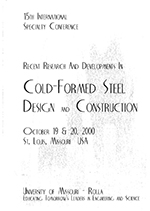Session Dates
19 Oct 2000
Abstract
The current specification provisions for the prediction of lateral restraint forces in Z-purlin supported roof systems under gravity loads are in Section D3.1 of the 1996 AlSI Specification for the Design of Cold-Formed Steel Structural Members (1996). The provisions need refinement, because they are empirical, have an incorrect treatment of roof slope and system effects, and ignore the effect of panel stiffness on restraint forces. Therefore, a new restraint force design procedure, having a stronger reliance on engineering principles, is proposed. Elastic stiffness models, with varying roof slope, panel stiffness, and cross-sectional properties, were used to develop the procedure. A new treatment of Z-purlin statics has led to a more accurate method of addressing roof slope. A system effect factor accounts for the observed nonlinear increase in restraint force with the number of restrained purlins. An adjustment factor varies the predicted restraint force depending on the shear stiffness of the roof panel. The proposed procedure applies to five bracing configurations: support, third-point, midspan, quarter point, and third-point plus support restraints.
Department(s)
Civil, Architectural and Environmental Engineering
Research Center/Lab(s)
Wei-Wen Yu Center for Cold-Formed Steel Structures
Meeting Name
15th International Specialty Conference on Cold-Formed Steel Structures
Publisher
University of Missouri--Rolla
Document Version
Final Version
Rights
© 2000 University of Missouri--Rolla, All rights reserved.
Document Type
Article - Conference proceedings
File Type
text
Language
English
Recommended Citation
Neubert, M. C. and Murray, Thomas M., "Estimation of Restraint Forces for Z-purlin Roofs under Gravity Loads" (2000). CCFSS Proceedings of International Specialty Conference on Cold-Formed Steel Structures (1971 - 2018). 1.
https://scholarsmine.mst.edu/isccss/15iccfss/15iccfss-session8/1
Estimation of Restraint Forces for Z-purlin Roofs under Gravity Loads
The current specification provisions for the prediction of lateral restraint forces in Z-purlin supported roof systems under gravity loads are in Section D3.1 of the 1996 AlSI Specification for the Design of Cold-Formed Steel Structural Members (1996). The provisions need refinement, because they are empirical, have an incorrect treatment of roof slope and system effects, and ignore the effect of panel stiffness on restraint forces. Therefore, a new restraint force design procedure, having a stronger reliance on engineering principles, is proposed. Elastic stiffness models, with varying roof slope, panel stiffness, and cross-sectional properties, were used to develop the procedure. A new treatment of Z-purlin statics has led to a more accurate method of addressing roof slope. A system effect factor accounts for the observed nonlinear increase in restraint force with the number of restrained purlins. An adjustment factor varies the predicted restraint force depending on the shear stiffness of the roof panel. The proposed procedure applies to five bracing configurations: support, third-point, midspan, quarter point, and third-point plus support restraints.



